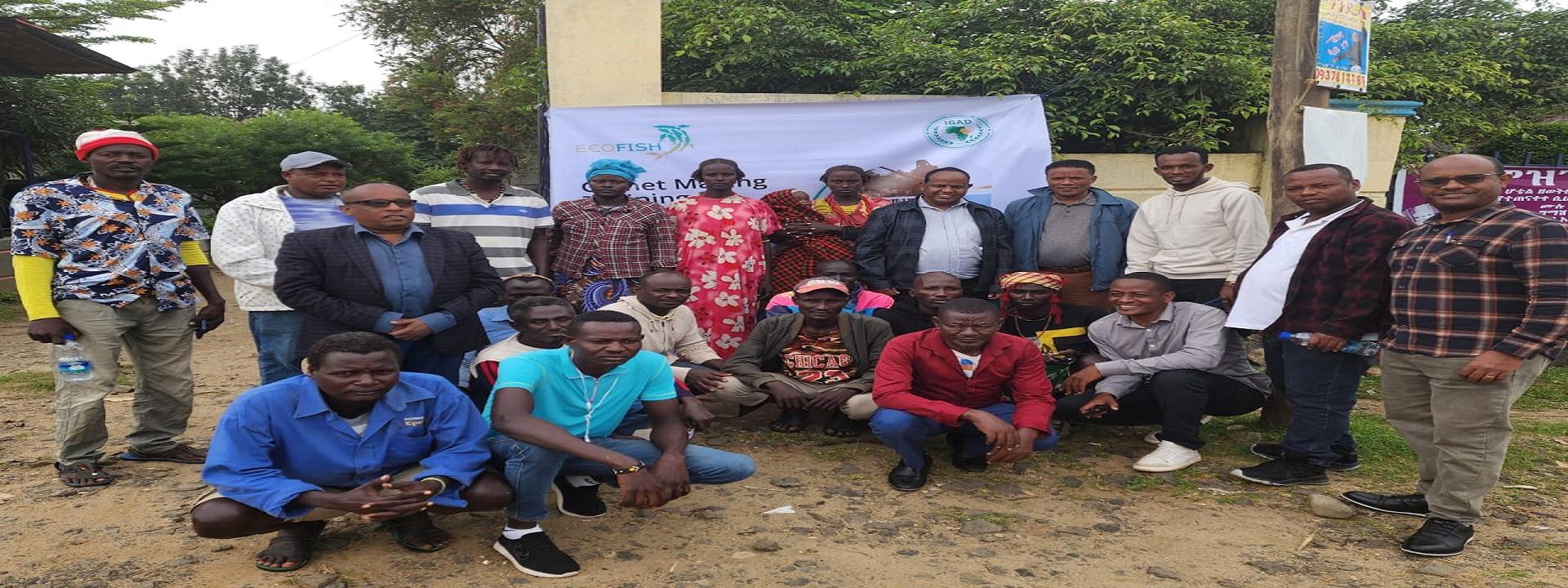August 09, 2024 (Jinka, Ethiopia): The Intergovernmental Authority on Development (IGAD), together with the Ministry of Agriculture of Ethiopia, through its European Union financed ECOFISH Project organized a three-day gillnet making hands-on training to the Lake Turkana fishing communities in Jinka Town, South Omo Zone, South Nations Nationalities Peoples Region (Ethiopia).
The IGAD-ECOFISH Project has developed and validated an integrated fisheries management plan (IFMP), or simply called fisheries co-management plan for Lake Turkana Basin. During the last decades, there has been a shift in the governance of fisheries to a broader approach that recognizes fishers’ participation and shared decision-making in the management of fisheries. Thus, the Lake Turkana Basin Fisheries Co-Management Plan is prepared based on the assumption that the resource users (fishing communities) will be involved in all the processes of the fisheries management system of the basin. Capacity gap identification assessment has been conducted by the project in basin and one of the recommendation was to cease the illegal monofilament fishing net use by the fishers due to the scarcity of the legal multifilament gillnet. Moreover, it was suggested that the trained community members may make gillnets and sell to the local communities. Therefore, this gillnet making practical training planned to be provided for the women and youth will contribute to the reduction of the illegal monofilament gillnets uses and it will serve also as one source of sustainable livelihood diversification
Mr. Sidrak Lefeka, South Omo Zone Livestock and Fisheries Extension Team Leader, In his welcoming remarks, noted that Dasench Woreda (District), which shares the Omo delta part of the lake has huge fish resource potential. In Dasenech alone there are about 6000 fishers. He also mentioned the key current challenges of the fisheries in the area. One of the problem is the use of destructive illegal fishing gear, monofilament fishing nets, as well as fishing for gas bladder (locally called Figna) which also targets juvenile Nile Perch. Mr. Sidrak stressed that this multifilament gillnet making training is very timely to minimize the use of the illegal fishing gears in the lake. He also suggested that if initial finance is available, women fishing communities will be benefited by through gillnet making for livelihoods.
On behalf of Mr. Daher Elmi, the Director of Agriculture and Environment Division of IGAD, Dr. Eshete Dejen, Programme Manager for Sustainable Environment Protection Unit, thanked the Government of Ethiopia for facilitating IGAD’s initiative towards sustainable fishing in Lake Turkana Basin. He also thanked the South Omo Zone Livestock and Fisheries Extension Office for facilitating the identification of the training participants, together with the Ministry of Agriculture and Dasenech Woreda Fisheries Extension Experts. Dr. Eshete also mentioned that gillnet making skills will contribute to improved household livelihoods and food security particularly for the women fishing communities. Dr. Eshete noted that IGAD is implementing this initiative in Ethiopia, Kenya and South Sudan; and similar training activities has been conducted in Lodwar (Kenya). This training will be also undertaken very soon in the Republic of South Sudan.
The Fisheries and Aquaculture Desk Head from the Ministry of Agriculture, Ethiopia, Dr. Fasil Dawit, in his official opening of the training thanked IGAD for organizing this training and EU for financing the project. Dr. Fasil also mentioned that the training is instrumental to cease the use of the destructive and illegal monofilament fishing nets in the lake. Dr. Fasil also mentioned that Ethiopia and Kenya signed Memorandum of Understanding to cooperate in the development of the fish resources and this will help to improve the fisheries management in Lake Turkana, which is shared between Ethiopia and Kenya. He concluded his opening speech by mentioning that the Government of Ethiopia has given serious attention for the fisheries development and recently developed end endorsed fisheries and aquaculture national masterplan.
Objectives of the training:
- To equip the skills to produce multifilament fishing gillnets by the fishing communities,
- To encourage legal fishing gear utilization by the fishing community,
- To diversify sources of livelihoods of the fishing communities
- To build capacity of local fishing communities to reduce the use of illegal fishing gears.
Outputs of the training:
- Women and youth from the local fishing communities trained to make fishing gillnets.
- Multifilament legal fishing gillnets produced by the trainees
- Capacities of local communities in using legal fishing gears improved
- Awareness created to make gillnet making an alternative for livelihood for the fishing communities.
Background
The Intergovernmental Authority on Development (IGAD) is one of the implementing Regional Economic Community for the ECOFISH Programme, a Cross-Regional Initiative funded by the 11th EDF to leverage regional cooperation for enhancing sustainable inland and marine fisheries in Eastern African, Southern Africa and the Indian Ocean (EA-SA-IO) region. IGAD applied and was granted a 3-year project on: Support to Sustainable Utilization, Development and Management of Two Transboundary Basins Fisheries of Baro-Akobo-Sobat River Basin (BASRB) shared between Ethiopia and South Sudan, and Lake Turkana Basin (LTB) shared between Ethiopia and Kenya.

